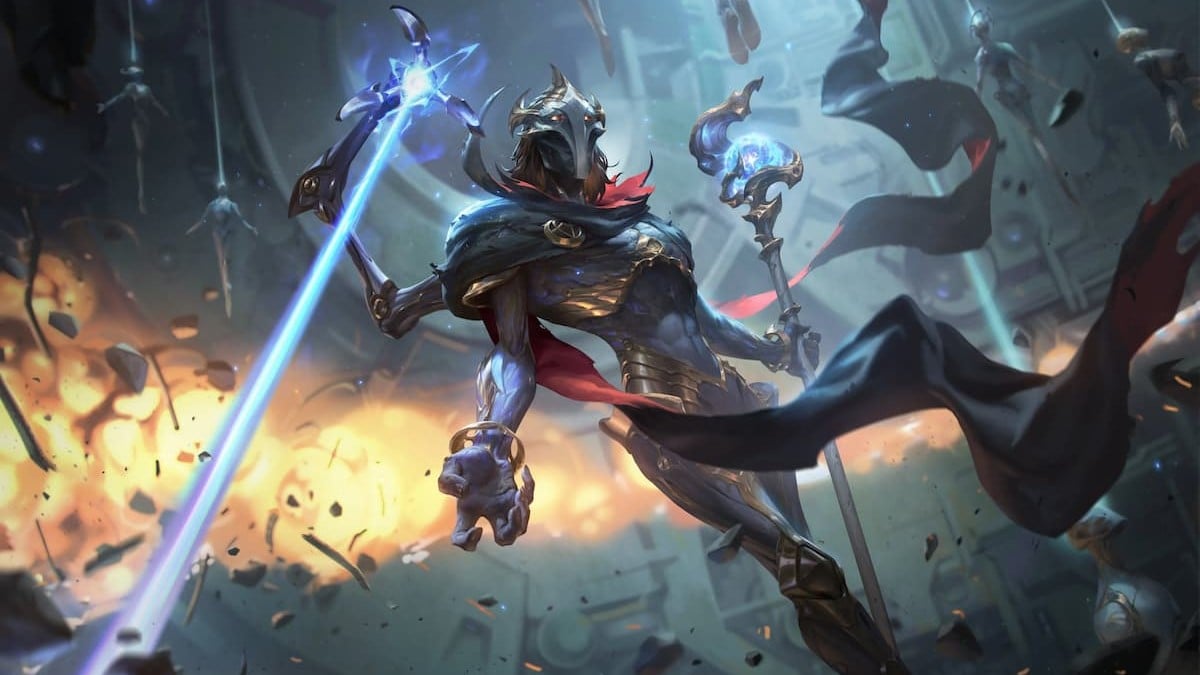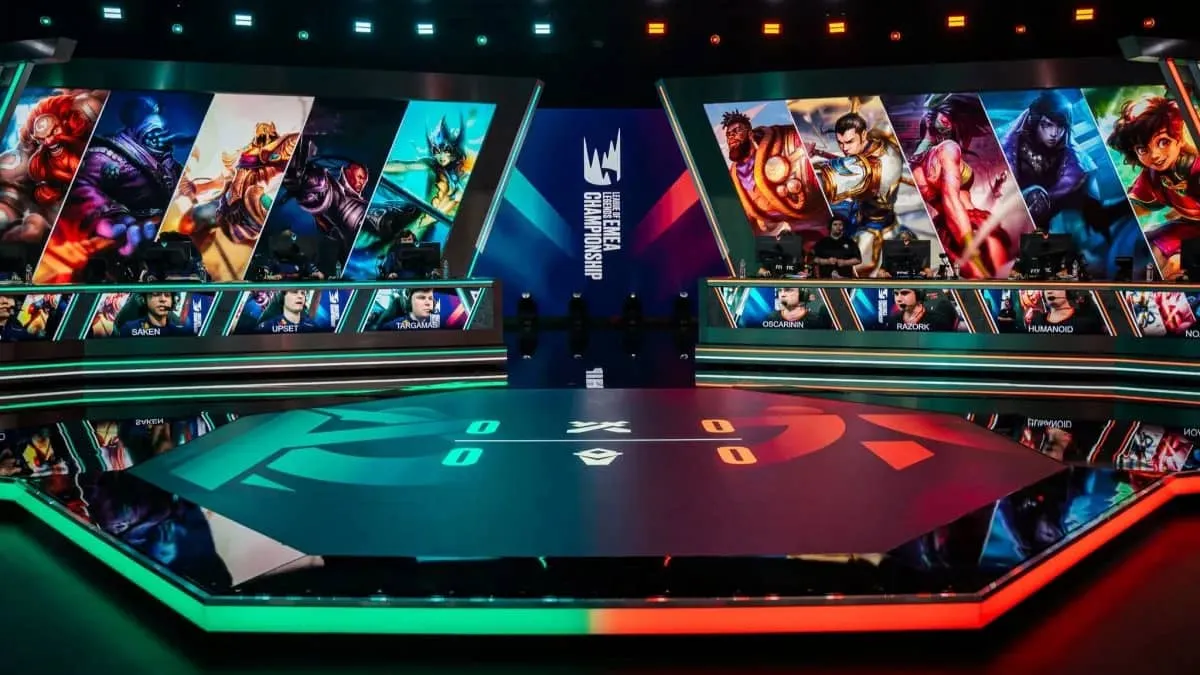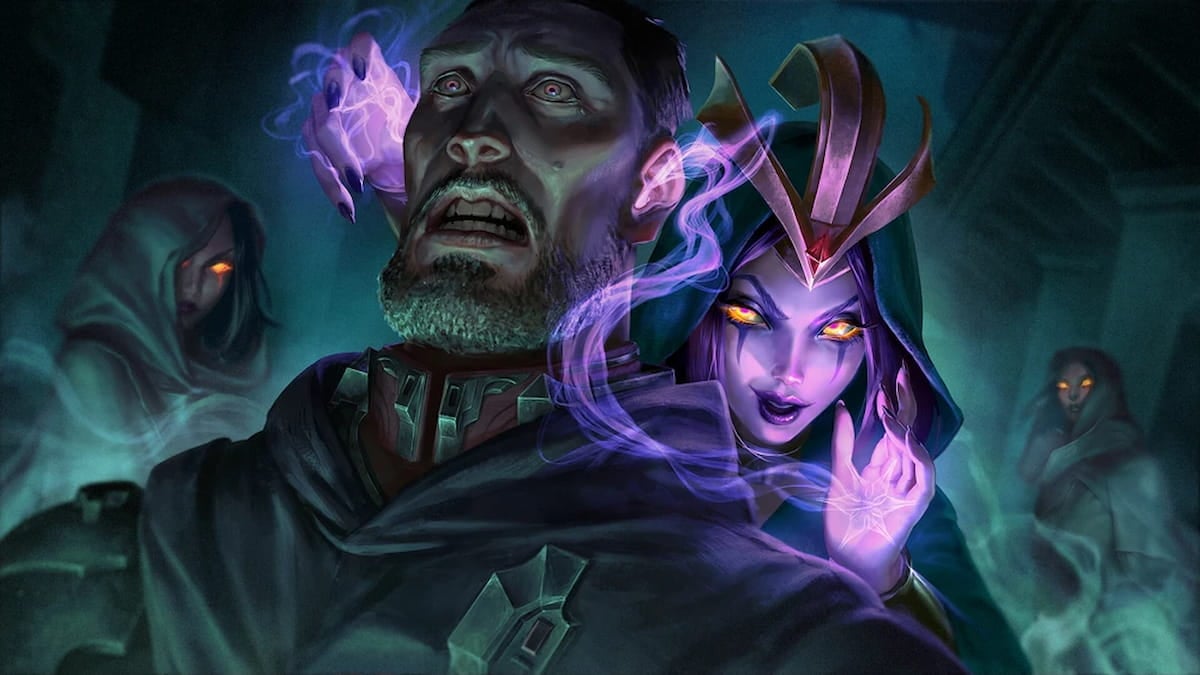Packed into a hall attached to the show floor for PAX Prime, the huge annual video game festival in Seattle, 3,000 people are preparing to watch an unceremonious execution.
The best League of Legends team in North America, Cloud9, is bullying their perennial challengers, Team SoloMid, in the final series of the region’s premier league. Cloud9 has never lost a game in the playoffs. And they’d swept SoloMid in each of the last two finals.
The first game ends with the predictable Cloud9 victory.
The crowd, full of TSM supporters, goes silent. Is it happening again?
For game two, Cloud9 left open Syndra, one of the signature champions for SoloMid superstar Soren “Bjergsen” Bjerg. That provides a glimmer of hope, but most just figure it’s intentional, all part of Cloud9’s plan.
When the match starts, Cloud9 focuses on Bjerg. He dies three times early. But SoloMid builds a lead. Eventually they push into the enemy base. Bjerg picks off Cloud9 mid laner Hai Lam with a well-timed ultimate, and stuns the other carry on the flank, preventing a response from Cloud9. SoloMid bursts into the base, wiping Cloud9 and taking the nexus.
The crowd erupts. “T-S-M! T-S-M!”
…
One year ago, an ocean and a continent separated Bjerg from the PAX Prime stage.
At the start of 2013, the Dane burst onto the European scene as the next star player. But for the the first three weeks of the European edition of the League Championship Series, Bjerg had to sit on the bench for his team, the Copenhagen Wolves. At the time, he was still16 years old, just shy of the league’s age minimum. The team went 0-5. But once Bjerg turned 17 and got into the lineup, they finished the season 13-10.
That caught the attention of legendary esports team Ninjas in Pyjamas, who acquired the Wolves squad before the Summer season. After a so-so Summer Split, the team dissapointed in the playoffs. The Ninjas fell to relegations, potentially dropping them out of the top tier of competition. One of Europe’s brightest young talents was about to be relegated.
Then, in September, Bjerg attended Riot Games’ World Championships at the Staples Center in Los Angeles, Calif. He was only there as a spectator, eager to see the best players in the world without the stress of competing. But at the championships, he’d meet the people behind Team SoloMid—the “New York Yankees” of League, as Riot Games’ esports overlord Dustin Beck puts it. They’d won a string of titles beginning in 2011, including the first season of the LCS in Spring 2013. The following season, however, the perennial American champs lost their crown to upstarts Cloud9, when they were swept in an embarrassing League Championship series final.
Bjerg’s attitude and demeanor impressed Solomid’s Steinbrenner-esque owner Andy “Reginald” Dinh so much that he signed Bjerg to his team without even a tryout, perhaps the biggest blockbuster free agent signing in the game’s history. Bjerg packed his bags and embarked on a seemingly insane quest: To become the best in the world.
Bjerg has a quiet self-assured confidence; he looks you in the eye when he shakes your hand. And all in all, he’s something of a stark contrast to some of the other young, relatively immature men littering the pro gaming ranks.
If Team SoloMid are the Yankees of League, then Bjerg might be their Derek Jeter—not the retiree of the present day, but the young Jeter who helped the Bronx Bombers win four straight championships. For SoloMid, Bjerg was the chosen one, hand-picked to replace Dinhhimself in the most important role—–the mid lane—on the most popular League of Legends team on the planet. He was tasked with returning storied SoloMid franchise to winning the championships they had become so accustomed to before Cloud9 emerged.
But was this young 17-year-old kid, who had never lived away from his family and his friends, ready for such a monumental challenge?
Bjerg certainly sounds like a pro, more than most esports players. He speaks the language of your average big sport press conference, dropping what would usually sound like media-ready platitudes like “confidence” and “belief” and “positivity.” But in Bjerg’s case, like a lot of other top athletes, he’s just being straightforward: He’s talking about what genuinely makes him a great player.
At first, playing in the North American LCS was almost easy for the young prodigy. SoloMid ran rampant through the league, in large part thanks to Bjerg’s insane ability to pick up solo kills, crushing other professional players in a way that almost shouldn’t be possible. He was a sensation; 70,000 people tuned in to his first streaming session on Twitch as a SoloMid member. Bjerg led the league with 155 kills and earned himself regular season MVP honors.
But in the finals, Team SoloMid crumbled against Cloud9, in a repeat of the Spring Split, when the Danish star wasn’t in the lineup. Bjerg was supposed to take the team to the next level, but they still couldn’t muster a game against the champions. And it wasn’t even close. Bjerg put up a 3/9/4 KDA through the three-game series, failing to capitalize on his talent and do what SoloMid signed him to do.
Bjerg realizes now it was a game of mentality. Last season they were defeated before the game even began. They said the right things going into the match, but that’s not how they actually felt.
“It felt more down,” Bjerg said. “After the entire series, everyone was trying to hide it. They still had all the nerves. They felt like we were the worse team, and there was no way we were going to win this.”
But that’s not how they felt on this past weekend.
…
SoloMid are down 2-1 in the best-of-five series, one game away from another heartbreaking failure. Cloud9, in the mold of a true champion, punched back after taking their first-ever blow.
But this time, SoloMid are ready. They know what adjustments they need to make, thanks to their new coaching staff. They surprise Cloud9 with the Ryze and Xerath pairing—Ryze’s root comboing into Xerath’s long-range ultimate.
Marcus “Dyrus” Hill and Bjerg combine to wreck Cloud9 in the most one-sided match of the series.
“This time it was actually genuine,” Bjerg tells me not long after the match. “Everyone felt like we could still win, that we were just as good of a team, and we could still win. Last time everyone was trying to have those feelings, but just weren’t having it. It’s just a lot more real this time. Everyone is more confident.”
The series goes to a deciding game five.
…
The confidence came from SoloMid and Bjerg’s transformation in a rough Summer Split. Unlike past seasons, where SoloMid’s pure skill allowed them to brute force their way through the league, this split—the all-important Summer season with three spots in the world championship on the line—was a struggle.
It was an arms race to make it worlds. Dignitas added two stars from the now-defunct Team Coast, Danny “Shiphtur” Le and Darshan “ZionSpartan” Upadhyaya. SoloMid rival Counter Logic Gaming, perhaps League’s pre-2004 Red Sox, cursed to never win, shipped in a top laner from Korea, Shin “Seraph” Wooyeong.
To keep up, SoloMid picked up young support Nicolas “Gleeb” Haddad and imported German jungler Maurice “Amazing” Stückenschneider to bolster the lineup.
But the start of the split was rocky for Bjerg and his team. The metagame shifted away from his favored assassins to support-style champions in the mid lane. His results faltered. Fans clamored for SoloMid to unleash the Bjerg of last season, the one that led the league in kills, and to stop playing him on support champions.
Bjerg believes he adapted well the meta—strategies, tactics, and planning—but the support mid meta frustrated him. He went from having “huge” impact on the game’s outcome to an average one. Playing support mids, “you kind of rely on what you do as a team,” Bjerg said. “And we just weren’t that great as a team.”
The team was 4-4 through three weeks. Picks and bans were a mess. Their teamwork was hit-and-miss. Rookie support Haddad struggled to juggle learning the all-important shot-calling role while adapting to the high level of play in the LCS. The pressure got to Bjerg.
“I lost confidence in myself and I started playing worse, because I thought I wasn’t as good as the other players and I was pulling my team down,” Bjerg said.
The team, led by their hard-headed owner and former captain Dinh, worked proactively to turn things around. Dinh brought in a coach on June 9, Korean ex-pro Choi “Locodoco” Yoon-sub, who quickly fixed the team’s pick-and-ban phase, giving SoloMid a boost in many of their matchups. Teamwork was more on point. The players were learning each other’s playstyles.
“I started feeling like my play was actually improving, as a team we were improving, we actually had a good grasp on the game,” Bjerg said.
“I wouldn’t just farm and go even and just not really have an impact on the game. I feel like it was mostly through the entire team learning together, we got more confident because we actually feel like we were playing as a team.”
Bjerg credits the man he calls “coach” for much of the team’s, and his own, transformation. But it wasn’t necessarily the X’s and O’s that made the biggest difference. “Having a coach can help you out with emotional problems,” Bjerg said. “It’s good to have someone that can make sure [we] always have the right mindset.”
One specific way Choi helped Bjerg was through a pre-game ritual he seemed almost embarrassed to reveal: meditation.
“He really helped me out with being nervous on stage,” he said. Choi taught him a breathing exercise designed to calm the nerves. “I do it before every match. It really helps me come to myself, and think that it isn’t that big of a deal. Even if I do bad, it’s not the end of the world. I still have a long way to go. It really helps me be in a good form going into the game.”
But even with the squad coming together, and Bjerg coming out of his funk, SoloMid still had issues. They swapped primary shot-callers seemingly week-to-week, giving Stückenschneider a chance before going back to Haddad and then to Bjerg. It didn’t work, at first.
“I was starting to play worse myself,” Bjerg said. “I lacked individual skill. So I said maybe someone else can take care of it.” Splitting attention between calls and mechanics takes a special kind of player. The role went back to Stückenschneider. Even Hill took a turn.
But eventually Bjerg had had enough. “I was like ‘All right. We’re having a really hard time putting this burden on someone,’” he said. “I felt like I can just pick it up, I can just master it, that’s still what I’m trying to do.”
It was a sign Bjerg was becoming more than just a star, but a leader. Assuming the mantle of shot caller, a difficult role. But he vowed to make it work.
“I’m probably not as good as Hai,” Bjerg said. “I’m probably not as good as a lot of people. But I’m really working towards and I’m getting a lot of help from our coaches and I’m slowly improving.”
With Bjerg settling into the shot caller role, determined to succeed at the difficult task while not letting it affect his individual play, the team made one last move. Choi brought in Korean support star Ham “Lustboy” Jang-sik, a former OnGameNet champion, to add much-needed vision control to the lineup. SoloMid was ready for the playoffs..
…
Game five. Bjergsen does his breathing exercises backstage, clearing his mind.
When it starts, the teams trade kills, objectives. The crowd roars. Duelling chants of “Cloud9!” “T-S-M!” rock the packed venue. It’s one of the closest matches in LCS history.
SoloMid repels a Cloud9 offensive and counters, leading to a confrontation outside of the Cloud9 base. Bjerg throws his Orianna ball into three members of Cloud9, hits R—and whiffs. Cloud9 escapes the shockwave unscathed. They kill for of his team, taking baron and a huge lead—the kind of lead they never relinquish.
In the past Bjerg might have gone on tilt. Hitting that ultimate might have won the fight and the game, but missing it may have lost it. But today Bjerg and SoloMid know it’s not over.
“It’s never really over until they kill your nexus and you lose the third game,” Bjerg would later tell me—League’s version of Yogi Berra’s famous “the game’s isn’t over until it’s over.”
SoloMid holds on. Cloud9 postures for another baron. Bjerg sees an opportunity. He calls a rush down mid lane to the open enemy inhibitor. If everyone follows, Team SoloMid will force Cloud9 back to base. They can force a favorable battle in a choke. But if one player hesitates, they will get picked off and die. SoloMid is making the kind of aggressive call on razor thin timing that usually makes Cloud9 so dangerous.
No one hesitates. They trust Bjerg.
Cloud9 chase through their jungle, funneling towards SoloMid. Bjerg lands his ultimate. Ham follows it with his own Tidal Wave. SoloMid pounces. Jason “WildTurtle” Tran and his Tristana score a quadra kill.
The game ends.
Team SoloMid are champions.
…
Bjerg earned Playoff MVP honors for his performance, posting a 6.8 KDA through play at PAX Prime. “Winning this is the reason I came here in the first place,” he tells me after the match. “Winning… it feels great.”
He stepped up as not only a star carry but as a leader, a player capable of taking his team to the next level: a true superstar and elite mid lane player. But despite his star presence, the title was an organizational effort.
Hill, the last remaining Team SoloMid veteran in the lineup, is now one of just two players to qualify for all four world championships, and his play in the finals reflected that. The rest of the team’s play was also superb.
Choi fixed many of SoloMid’s problems during the season and made an obvious impact during the match, allowing the team to adjust to Cloud9’s strategy through the best-of-five, something SoloMid has failed to do in the past.
“We definitely wouldn’t have won without our coach,” Bjerg said. Even calling him “coach” shows the respect he commands; most players outside Korea take a more informal tone or epithet with the ex-pros signed on to lead them.
And Dinh really is a Steinbrenner-esque figure at the head of League’s Yankees. He’s stubborn and wants everything done his way. But his way works. He didn’t passively wait for his team to overcome their problems, he actively helped them, adding infrastructure, acquiring players, even making a roster change late in the season.
Even with all the right moves, Dinh still needed his Derek Jeter. Bjerg came to America as a talented, but raw, emerging star. He’s grown from a player on a relegated team, to an underperforming playoff finalist, to a leader capable of performing on the biggest stage and carrying his team to a championship.
But the real Jeter has five World Series titles. Bjerg and his team have a long way to go. Earlier this week, they took a flight to Korea, where they’ll practice against the best teams in the world as they prepare for the biggest stage in League of Legends: October’s World Championships.
Korean teams have dominated the world stage in recent years, and few would give Team SoloMid a chance. Then again, as the fans who packed PAX learned over the weekend, Team SoloMid and Bjerg don’t really care about who’s supposed to win a championship.
Photo via Riot Games






Published: Sep 4, 2014 02:36 pm